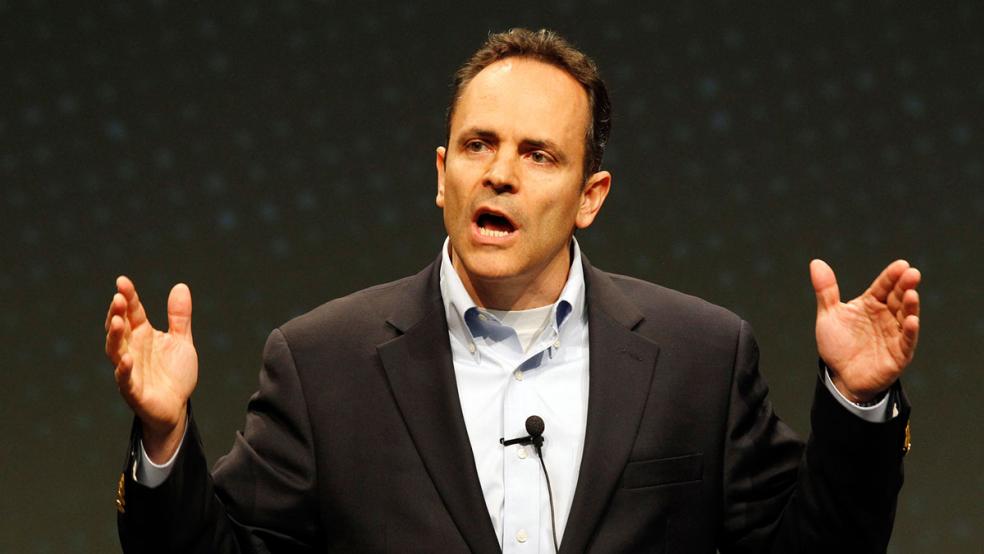Tea party Republican Matt Bevin had to tone down his anti-Obamacare rhetoric in order to win election as governor of Kentucky last November.
Since then, there has been intense speculation over what Bevin would do to make good on his campaign promise to phase out Kynect, Kentucky’s state-run health insurance exchange created under the Affordable Care Act that is widely seen as a model of efficiency and effectiveness.
Related: Nearly Half of Obamacare Co-Ops Are Closing
The answer came recently with confirmation that Bevin is moving expeditiously to dismantle Kynect and transfer its responsibilities for providing nearly 100,000 Kentuckians with private health care insurance to the federal insurance exchange.
Bevin is also seeking a waiver from the federal government to tighten up eligibility requirements to make it harder for many to qualify or remain enrolled in the state Medicaid program for the poor that was expanded considerably under the Affordable Care Act.
The new governor has argued that preserving Kynect would be a “wasteful redundancy” because state residents can also obtain insurance through the federal exchange. “We in Kentucky will not pay twice for the same service,” he told reporters last month, adding that he hoped to wind down the state program by the end of this year.
Bevin is a hero among conservative Republicans who have been trying for years in Washington to either dismantle or seriously weaken the ACA, the signature health care initiative of President Obama.
However, critics and healthcare advocates warn that Bevin’s move will create chaos and confusion for more than two million Kentuckians who currently are enrolled in private health insurance policies or Medicaid through Kynect.
Related: 7 Obamacare Predictions That Haven’t Come True
The move will also almost certainly cost the state millions of dollars in forfeited federal grants for the state-run program and lead to the layoff of numerous Kynect employees.
“There’s really no business case for doing this, as far as it being less expensive or somehow less burdensome on Kentucky,” Emily Beauregard, executive director of Kentucky Voices for Health, an advocacy organization, said in an interview on Wednesday. “At this point, what we expect to see is more cost to Kentucky, more work for state officials” – and more inconvenience for consumers.
The state-run insurance exchange created under former Democratic governor Steve Beshear has enrolled 93,687 Kentuckians for private health insurance this year and more than 1.3 million people as part of the expanded Medicaid program authorized by Obamacare.
Kentucky is one of 18 states that created their own insurance exchanges under Obamacare. The remaining states have left it to the nationwide federal exchange, HealthCare.gov, to sign up Americans for the program. Bevin contends that Kynect is redundant and unnecessary, and had signaled plans to end the program.
Bevin notified the U.S. Department of Health and Human Services in a Dec. 30 letter that the dismantling and transition would be undertaken “as soon as is practicable.” That prompted a Jan. 28 response from an HHS official stating that “ceasing Kynect will create a number of challenges that must be addressed to ensure that access to affordable health coverage continues for Kentucky’s consumers,” according to Insider Louisville.
Related: 7 Obamacare Predictions That Haven’t Come True
Andrew Slavitt, the acting administrator of the Centers for Medicare and Medicaid, raised a number of red flags in his response to Bevin and outlined “a set of activities that Kentucky will need to immediately take to ensure a smooth transition for its consumers.” These include:
- Producing a detailed plan for how the state will continue to meet its obligations to enrollees and future enrollees through 2016.
- Arranging for discussions between insurers participating in Kynect and the federal Centers for Medicare and Medicaid “to ensure that those companies understand the transition activities.”
- Paying a 3 percent fee on insurance costs required of states that steer their residents to the federal exchange to purchase subsidized and market-rate health insurance policies.
- Forgoing nearly $58 million of the $289 million in federal grants that Kentucky received to help establish Kynect. None of those remaining funds can be used to cover the costs of the transition. And it’s possible the federal government will attempt to reclaim the more than $200 million of grant money already spent.
Bevin has argued that dismantling Kynect would be relatively easy and not terribly costly to the state. But it looks like the new Republican governor’s dream of ridding the state of responsibility for Obamacare could create budgetary and logistical difficulties for residents and state officials.
Related: GOP Fires a Warning Shot in Kentucky in the War Against Obamacare
A consultant retained by the Beshear administration estimated that shuttering Kynect would cost $23 million, but that may prove to be an optimistic assumption given the loss of the federal grant.
Beyond that, Kynect is unusual because it has successfully integrated its private insurance exchange with Medicaid and the Childrens’ Health Insurance Program (CHIP). As a result, Slavitt warned in his letter to Bevin, the state will have to decouple these three programs and figure out how to continue to administer the Medicaid and CHIP programs while sending responsibility for the private insurance market back to the federal government.





